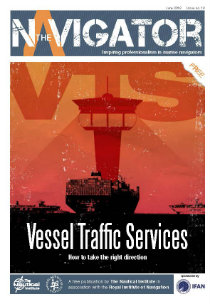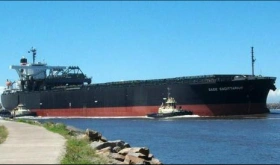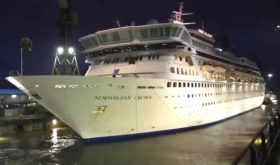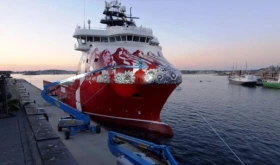The Marine Environment Protection Committee (MEPC) of the International Maritime Organization (IMO) met for its 65th session from 13 to 17 May 2013, at IMO Headquarters in London. Among others the Committee made significant progress in its work on further developing energy-efficiency regulations, adopting a MEPC Resolution on Promotion of Technical Co-operation and Transfer of Technology relating to the Improvement of Energy Efficiency of Ships and giving the go-ahead to carry out an update to the greenhouse gas (GHG) emissions’ estimate for international shipping. Moreover, a draft Assembly resolution to address the implementation of the Ballast Water Management convention has been approved and approved a number of ballast water treatment systems.
Resolution on technical cooperation for energy efficiency measures. The MEPC adopted MEPC.229(65) on Promotion of Technical Co-operation and Transfer of Technology relating to the Improvement of Energy Efficiency of Ships.
Update of GHG emissions estimate. The MEPC agreed to initiate a study for an updated greenhouse gas (GHG) emissions’ estimate for international shipping, following discussion in an expert workshop, which met earlier this year, on the methodology and assumptions to be used. The Committee decided to perform an update of the GHG study to be finalized in March 2014. There were no further developments of Market Based Measures at this session.
Development of energy-efficiency measures for ships. The MEPC continued its work on further developing technical and operational measures relating to energy-efficiency measures for ships. More specifically the Committee:
- Approved draft amendments to MARPOL Annex VI, with a view to adoption at MEPC 66, to extend the application of EEDI to ro-ro cargo ships (vehicle carrier), LNG carriers, cruise passenger ships having non-conventional propulsion, ro-ro cargo ships and ro-ro passenger ships; and to exempt ships not propelled by mechanical means, and platforms including FPSOs and FSUs and drilling rigs, regardless of their propulsion; as well as cargo ships having ice-breaking capability. The amendment is expected to be adopted in April 2014 and will enter into force 16 months later (late 2015).
- Adopted amendments, MEPC.231(65), to update resolution MEPC.215(63) Guidelines for calculation of reference lines for use with the EEDI, including the addition of ro-ro cargo ships (vehicle carrier), ro-ro cargo ships and ro-ro passenger ships, and LNG Carriers.
- Noted, with a view to adoption at MEPC 66, the finalized amendments to resolution MEPC.212(63) 2012 Guidelines on the method of calculation of the attained EEDI for new ships.
- Approved amendments through MEPC.1-Circ.814 to unified interpretation MEPC.1-Circ.795, to update the circular with regards to requirements for SEEMP, to exclude platforms (including FPSOs and FSUs), drilling rigs, regardless of their propulsion, and any other ship without means of propulsion;
- Adopted the 2013 Interim Guidelines, MEPC.232(65), for determining minimum propulsion power to maintain the manoeuvrability of ships in adverse conditions, which are intended to assist Administrations and recognized organizations in verifying that ships, complying with the EEDI requirements set out in regulation 21.5 of MARPOL Annex VI, have sufficient installed propulsion power to maintain the manoeuvrability in adverse conditions.
- Approved the 2013 Guidance on treatment of innovative energy efficiency technologies for calculation and verification of the attained EEDI, which are intended to assist manufacturers, shipbuilders, shipowners, verifiers and other interested parties related to the EEDI of ships to treat innovative energy efficiency technologies for calculation and verification of the attained EEDI, addressing systems such as air lubrication, wind propulsion systems; high temperature waste heat recovery systems; and photovoltaic power generation system.
- Adopted the 2013 Guidelines, MEPC.233(65), for calculation of reference lines for use with the EEDI for cruise passenger ships having non conventional propulsion.
- Adopted MEPC.234(65) which amends resolution MEPC.214(63) 2012 Guidelines on survey and certification of the EEDI, to add references to measuring sea conditions in accordance with ITTC Recommended Procedure 7.5-04-01-01.1 Speed and Power Trials Part 1; 2012 revision 1 or ISO 15016:2002.
- Endorsed a work plan to continue the work on development of the EEDI framework for ship types and sizes, and propulsion systems not covered by the current EEDI requirements and to consider guidelines on propulsion power needed to maintain the manoeuvrability of the ship under adverse conditions.
Further measures to improve the energy efficiency of ships. The MEPC agreed to establish a sub-agenda item under the MEPC’s agenda item 4 (Air pollution and energy efficiency), for discussion of further technical and operational measures for enhancing energy efficiency for international shipping, and to establish a working group under this sub-agenda item at MEPC 66.
Draft Assembly resolution agreed and ballast water management systems. The MEPC approved a draft IMO Assembly resolution on the application of regulation B-3 of the BWM Convention to ease and facilitate the smooth implementation of the Convention, for submission to the 28th session of the IMO Assembly (25 November to 4 December 2013). The draft resolution recommends that ships constructed before the entry into force of the Convention will not be required to comply with regulation D-2 until their first renewal survey following the date of entry into force of the Convention. The aim of the draft resolution is to clarify uncertainty in relation to the application of regulation B-3, through the application of a realistic timeline for enforcement of regulation D-1 (ballast water exchange standard) and regulation D-2 (ballast water performance standard), upon entry into force of the Convention.
The MEPC granted Basic Approval to three, and Final Approval to three, ballast water management systems that make use of Active Substances. Basic Approval was granted to: Van Oord (NL), REDOX (NORWAY), and Blue Zone (REPUBLIC OF KOREA) whilst that for HyCator (INDIA) was refused pending further development. Final Approval was granted to: AQUARIUS (NL), EcoGuardian (REPUBLIC OF KOREA) and Ocean Doctor (CHINA) but PERACLEAN Ocean Sky System (JAPAN) was rejected. The total number of type-approved ballast water management systems now stands at 33. Furthermore, a resolution has been issued regarding information reporting on type approved ballast water management systems, MEPC.228(65).
The MEPC also approved BWM-related guidance, including Guidance concerning ballast water sampling and analysis for trial use and a BWM Circular on clarification of “major conversion” as defined in regulation A-1.5 of the BWM Convention.
Draft amendment on implementation date for Tier III engines. The MEPC considered and agreed to proposed draft amendments to MARPOL Annex VI regulation 13 on Nitrogen Oxides (NOx), to amend the date for the implementation of “Tier III” standards within emission control areas (ECAs). A correspondence group led by USA concluded that there were no significant barriers to entry into force of the 2016 Tier 3 NOx requirements. A dissenting view was raised by a number of flag states and the entry into force date was subsequently approved postponed from 2016 to 2021. A number of flag states including the USA reserved their position on this decision. The amendment to MARPOL will need to be adopted at MEPC 66 by a 2/3 majority amongst parties having ratified Annex VI. It is not clear if such a majority will be forthcoming.
- NOx control requirements apply to installed marine diesel engines of over 130 kW output power, and different levels (Tiers) of control apply based on the ship construction date.
- Tier III controls apply only to specified ships while operating in ECAs designated to limit NOx emissions (currently the North American Emission Control Area and the United States Caribbean Sea Area). Outside such areas, “Tier II” controls apply.
The committee also agreed in the issuance of MEPC.1-Circ.812 which approved a unified interpretation to MARPOL Annex VI on the time of replacement of an engine.
Draft NOx Technical Code amendments. The MEPC approved, with a view to subsequent adoption, draft amendments to the NOx Technical Code, 2008, concerning use of dual-fuel engines.
Guidelines for implementation of MARPOL Annex VI regulation 13. The MEPC adopted MEPC.230(65), as required by regulation 13.2.2 of MARPOL Annex VI, in respect of non-identical replacement engines not required to meet the Tier III limit; and a unified interpretation in MEPC.1-Circ.813 on the “time of the replacement or addition” of an engine for the applicable NOx Tier standard for the supplement to the IAPP Certificate.
MARPOL amendments to make RO Code mandatory. The MEPC adopted MEPC.238(65) amending MARPOL Annexes I and II to make mandatory the Code for Recognized Organizations (ROs). Moreover MEPC.237(65) adopts the code for Recognized Organizations (RO Code) providing a consolidated text containing criteria against which ROs (which may be authorized by flag States to carry out surveys and issue certificates on their behalf) are assessed and authorized/recognized, and give guidance for subsequent monitoring of ROs by Administrations. The RO code is contained in MSC.349(92).
The IACS amendments can be referred as follows:
- In case of an RO only having ISM for a ship, it will not be required to have this vessel in its register, and only a “list” of ISM ships need to be kept.
- Within one month (not “prior to” as originally proposed) of the issuance of the certificates, the gaining organization shall advise the losing organization of the date of issue of the certificates and confirm the date, place and action taken to satisfy each overdue survey, overdue recommendation and overdue condition of class.
- In the rare case of a NB where the flag State is not known at the initiation of a building process the national requirements are not known as well. Then the national requirements cannot be verified until the Flag State is known. Therefore the RO code was amended to reflect this point.
- In order not to preclude recognition by the flag State or another organization recognized by the same flag State, the RO Code was amended to reflect this.
The MEPC also adopted MEPC.235(65) which amends Form A and Form B supplements to the IOPP Certificate. MEPC.236(65) has been also adopted, which amends the Condition Assessment Scheme, to make reference to the International Code on the enhanced programme of inspections during surveys of bulk carriers and oil tankers, 2011 (2011 ESP Code).
Correspondence group on ship recycling re-established. The MEPC re-established a correspondence group to finalize the development of threshold values and exemptions applicable to the materials to be listed in Inventories of Hazardous Materials and amend accordingly the 2011 Guidelines for the Development of the Inventory of Hazardous Material.
A new paragraph was included in the Inventory Guidelines to make clear that revised threshold values should not be applied retroactively to IHMs.
All threshold values for table B materials were evaluated and kept at existing levels except for polychloronaphtalenes which was changes from “no threshold level” to 50 ppm, in line with the Basel Convention. Changing the threshold value for PBBs was not concluded following discussions on whether to align the value with the Basel Convention or with the RoHS Directive (Directive 2011/65/EU).
Complexity of testing for asbestos and expected implications for MSC.1/Circ.1374 on removal of asbestos withheld a conclusion on whether asbestos threshold value of 0,1% or 1% should be adopted.
Guidance on evaluating biofouling guidelines. The MEPC approved an MEPC circular on Guidance for evaluating the 2011 Guidelines for the control and management of ships’ biofouling to minimize the transfer of invasive aquatic species.
Implementation of MARPOL Annex V. The MEPC adopted MEPC.239(65) which amends the 2012 Guidelines for the implementation of MARPOL Annex V, adding references to E-waste generated on board such as electronic cards, gadgets, equipment, computers, printer cartridges, etc. The MEPC also approved draft amendments to the form of Garbage Record Book under MARPOL Annex V, to update the Record of Garbage Discharges, for circulation, with a view to adoption at MEPC 66.
Finally, the MEPC also approved an MEPC.1-Circ.810 circular on adequate port reception facilities for cargoes declared as harmful to the marine environment (HME) under MARPOL Annex V, which agrees that, until 31 December 2015, cargo hold washwater from holds previously containing solid bulk cargoes classified as HME, may be discharged outside special areas under specific conditions. The circular also urges Parties to MARPOL Annex V to ensure the provision of adequate facilities at ports and terminals for the reception of solid bulk cargo residues, including those contained in wash water.
Finally the committee approved MEPC.1-Circ.809 which represents the revised Guidance on the management of spoilt cargoes and is referred here due to its applicability to MARPOL Annex V.
Specifications for oil discharge monitoring and control systems for oil tankers. The committee adopted MEPC.240(65) which amends the revised guidelines and specifications, MEPC.108(49), for oil discharge monitoring and control systems for oil tankers.
The full IMO report on MEPC 65 decisions can be found by clicking HERE.
Sources: IMO, InterManager, DNV














Leave a Comment